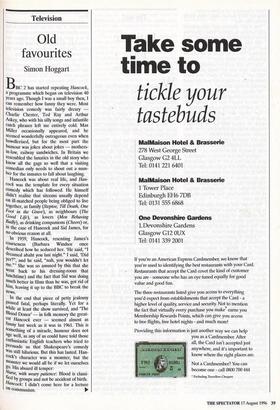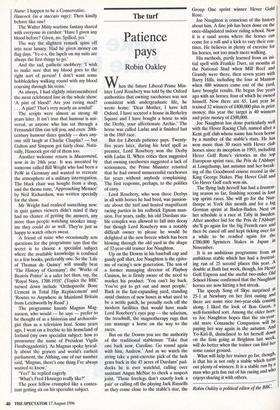Television
Old favourites
Simon Hoggart BBC 2 has started repeating Hancock, a programme which began on television 40 Years ago. Though I was a small boy then, I can remember how funny they were. Most television comedy was fairly dreary Charlie Chester, Ted Ray and Arthur Askey, who with his silly songs and infantile catch phrases left me entirely cold. Max Miller occasionally appeared, and he seemed wonderfully outrageous even when bowdlerised, but for the most part the humour was jokes about jokes — mothers- in-law, railway sandwiches. In Britain we resembled the lunatics in the old story who know all the gags so well that a visiting comedian only needs to shout out a num- ber for the inmates to fall about laughing. Hancock was about real life, and Han- cock was the template for every situation comedy which has followed. He himself didn't realise that sitcoms usually depend on ill-matched people being obliged to live together, as family (Steptoe, 7111 Death, One Foot in the Grave), as neighbours (The Good Life), as lovers (Men Behaving Badly), as drinking companions (Cheers) or, m the case of Hancock and Sid James, for no obvious reason at all.
In 1959, Hancock, resenting James's coarseness (Barbara Windsor once described how he seduced her. 'He said, "I dreamed abaht you last night." I said, 'Did Yer?", and he said, "nah, you wouldn't let Me." She was so amused by this that she Went back to his dressing-room that lunchtime) and the fact that Sid was doing much better in films than he was, got rid of him, leaving it up to the BBC to break the news.
In the end that piece of petty jealousy Proved fatal, perhaps literally. Yet for a While at least the show survived, and 'The }Mood Donor' — in folk memory the great- est Hancock ever — seemed almost as funny last week as it was in 1961. This is something of a miracle, humour does not age well, as any of us could have told those enthusiastic English teachers who tried to Persuade us that Shakespeare's comedy Was still hilarious. But this has lasted. Han- cock's character was a monster, but the monster we would all be if we let ourselves go. His absurd ill temper: Nurse, with weary patience: Blood is classi- fied by groups and not be accident of birth. Hancock: I didn't come here for a lecture on communism. Nurse: I happen to be a Conservative.
Hancock (in a staccato rage): Then kindly behave like one!
The Walter Mitty wartime fantasy shared with everyone in earshot: 'Have I given any blood before? Given, no. Spilled, yes.'
The way the slightest remark spins off into near lunacy. Had he given money on flag days. 'Ye-e-s, the lapels on my suits are always the first things to go.'
And the sad, pathetic snobbery: 'I wish, to make sure that my blood goes to the right sort of person! I don't want some hobbledehoy walking round with my blood coursing through his veins.'
As always, I had slightly misremembered the most celebrated line in the whole show: 'A pint of blood? Are you raving mad? ... A pint? That's very nearly an armful!'
The scripts were almost as strong 40 years later. It isn't true that humour is uni- versal, as anyone who has sat through a Fernandel film can tell you, and even 20th- century humour dates quickly — does any- one still laugh at Charlie Chaplin? — but Galton and Simpson got fairly close. Natu- rally, Hancock got rid of them too.
Another welcome return is Mastermind, now in its 24th year. It was invented by someone called Bill Wright who had been a PoW in Germany and wanted to recreate the atmosphere of a military interrogation. The black chair was bought from a shop, and the theme tune, 'Approaching Menace' by Neil Richardson, was written specially for the show.
Mr Wright had realised something new: in quiz games viewers didn't mind if they had no chance of getting the answers, any more than people watching snooker imag- ine they could do as well. They're just as happy to watch others sweat.
A friend of mine who occasionally sets questions for the programme says that the secret is to choose a specialist subject where the available knowledge is confined to a few books, preferably one. So the 'Life of Thomas de Quincy' will usually beat 'The History of Germany': the 'Works of Beatrix Potter' is a safer bet than, say, the 'Royal Navy, 1708-1918'. (Topics the BBC turned down include 'Orthopaedic Bone Cement in Total Hip Replacement' and 'Routes to Anywhere in Mainland Britain from Letchworth by Road'.)
The programme haunts Magnus Mag- nusson, who would — he says — prefer to be thought of as a historian and archaeolo- gist than as a television host. Some years ago, I went on a freebie to his homeland of Iceland (my own specialist subject: how to pronounce the name of President Vigdis Finnboggadottir). As Magnus spoke lyrical- ly about the geysers and world's earliest parliament, the Althing, one of our number said, 'Magnus, there's one thing I've always wanted to know.'
'Yes?' he replied eagerly.
'What's Fred Housego really like?'
The poor fellow crumpled like a contes- tant getting six on his specialist subject.



















































 Previous page
Previous page